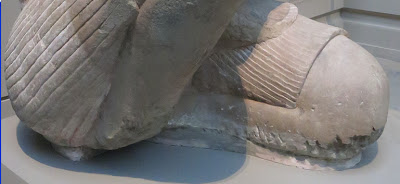.
With regard to the question of how the beheaded Doryodhama statue (now the subject of a legal dispute between the US government and Sotheby's) came onto the market, it is worth taking a close look at the two attendants from Koh Ker, some of the bits of which were presented by a Thai-based collector to the New York Metropolitan Museum, as we recall, they too had been transported with the heads detached. In particular it is instructive to look at the knees of the one on the right of the door.
Those are not even pickaxe marks (where would the worker be standing to make them?) but look as if done with a crowbar (aka a 'wrecking bar' in some circles). They are also all too obviously fresh. Surely anyone considering acquiring such an item would have noticed such damage, and asked themselves just how that object was separated from the rest of the monument and then appeared on the market. The only possible (honest) answer to that question would surely lead the responsible person to avoid touching such an item. Buying it is not "saving the art", merely putting money into the pockets of those profiting from the mistreatment of monuments and the saleable elements that comprise them.
Kudos though to the Met that they did not patch the scars showing clearly that those items should NOT be in New York, but were ripped off a foreign monument by robbers. They should now go back.
It is notable that photos show that many of the Khmer objects in the Met lack feet, is this some kind of convention, looters feel that buyers prefer them that way so they can be displayed as if 'floating' rather than standing (as in a "context")? Or is it that even a small pedestal adds to the costs of transport and makes the object bulkier still to hide when it is being smuggled?
This photo is adapted from one belonging to Pigalle's photostream (

 Some Rights Reserved)
Some Rights Reserved)
With regard to the question of how the beheaded Doryodhama statue (now the subject of a legal dispute between the US government and Sotheby's) came onto the market, it is worth taking a close look at the two attendants from Koh Ker, some of the bits of which were presented by a Thai-based collector to the New York Metropolitan Museum, as we recall, they too had been transported with the heads detached. In particular it is instructive to look at the knees of the one on the right of the door.
Those are not even pickaxe marks (where would the worker be standing to make them?) but look as if done with a crowbar (aka a 'wrecking bar' in some circles). They are also all too obviously fresh. Surely anyone considering acquiring such an item would have noticed such damage, and asked themselves just how that object was separated from the rest of the monument and then appeared on the market. The only possible (honest) answer to that question would surely lead the responsible person to avoid touching such an item. Buying it is not "saving the art", merely putting money into the pockets of those profiting from the mistreatment of monuments and the saleable elements that comprise them.
Kudos though to the Met that they did not patch the scars showing clearly that those items should NOT be in New York, but were ripped off a foreign monument by robbers. They should now go back.
It is notable that photos show that many of the Khmer objects in the Met lack feet, is this some kind of convention, looters feel that buyers prefer them that way so they can be displayed as if 'floating' rather than standing (as in a "context")? Or is it that even a small pedestal adds to the costs of transport and makes the object bulkier still to hide when it is being smuggled?
This photo is adapted from one belonging to Pigalle's photostream (


 Some Rights Reserved)
Some Rights Reserved)






.jpg)


1 comment:
The same "standard" seems to hold true for many Gandharan and south Indian derived stone sculptures on the market or on display... Doubt it's coincidental.
Post a Comment